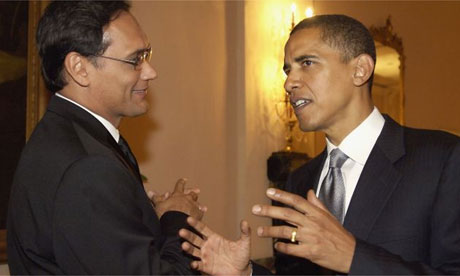As a huge West Wing fan, I found this article pretty cool, and a little surreal. How much did David Axelrod have in mind a possible Obama candidacy when he advocated for and helped create the character of Matthew Santos? Strange, very strange.
A Race Straight Out of a 'West Wing' Rerun
By Peter FuntMonday, May 26, 2008; Page A17
How's this for a political plot: Good-looking congressman in his mid-40s, married with two young children, known for his inspirational speeches, comes from far behind to clinch the Democratic nomination and face an older, more experienced centrist Republican. If he wins, he's America's first non-Caucasian president.
It's a drama that plays out each day in the papers and through nonstop cable-TV coverage. But some are beginning to notice that it's a rerun. The whole thing was broadcast a few years back on NBC's "The West Wing."
As one who believes Aaron Sorkin's program belongs on a short list of television's finest dramas, I've been fascinated by similarities between the show's Democratic candidate, Matthew Santos, and the party's apparent real-life counterpart, Barack Obama. With Obama's nomination becoming more certain, "West Wing" references have intensified among bloggers and in the British press.
Apparently even Obama's staff is taking note of the degree to which life is imitating art. (They especially like the ending in which Santos, played by Jimmy Smits, narrowly defeats Alan Alda's character, Arnold Vinick, who bears more than a little resemblance to John McCain.)
Here's Santos on the campaign trail: "In a time of global chaos and instability, where our faiths collide as often as our weapons, hope is real . . . I am sure I will have my share of false starts. But there is no such thing as false hope. There is only hope."
How is this happening? Is politics so predictable, even in what some call the most unpredictable campaign ever? Or were the writers of "The West Wing" just that insightful? Turns out, it's a little of both.
The Santos character was created by Eli Attie, currently co-executive producer of Fox's "House M.D.," who spent four years as head speechwriter for Al Gore during the Clinton administration. Gore's 2000 concession speech was Attie's final task before seeking a career in television. He joined the "West Wing" writing staff during the third season.
As Attie explained it to me, the Santos-Vinick campaign was invented in mid-2004, about the time Barack Obama gave his acclaimed speech at the Democratic convention. David Axelrod, Attie's friend and now Obama's chief strategist, suggested that Obama was a "rock star" politician whose profile was perfect for Attie's needs. Since NBC had already signed Smits to play the part, the character became Hispanic.
"We were trying to look at what was happening in the country and around the world," recalls Attie. "Things are more multicultural, more diverse. We tried to look ahead of the curve, and it seemed inevitable that a successful Latino or black candidate would emerge."
Even though Obama had not yet won his Senate seat, Axelrod was promoting him as "handsome, appealing, articulate" -- a politician who could find new paths to solve old problems; a minority candidate who could show pride in his race without allowing it to define him. That's what Matt Santos became.
Alan Alda's character, although in many ways eerily similar to McCain, did not have a real-life model. Most of the Vinick episodes were written by Lawrence O'Donnell, professional pundit and onetime adviser to Sen. Daniel Patrick Moynihan. Attie notes that Vinick, a Republican senator from California, was crafted with wisdom O'Donnell collected from the maverick New York Democrat (branded with the term "straight talk").
Attie doesn't care to comment much about the real-life campaign. But as a TV writer he provides this perspective: "Ultimately, the characters are not defined by who they are. They're defined by what they want."
On "The West Wing," Santos battles a White House insider, Vice President Bob Russell, played in real life by Hillary Clinton. A deadlocked Democratic convention finally nominates Santos, who selects an older, experienced Washington pro, Leo McGarry, as his running mate (Joe Biden?). Vinick, the GOP candidate, chooses the young West Virginia governor Ray Sullivan, who is a favorite of evangelicals (Mike Huckabee?).
Santos and Vinick depart from the conventional debate format and question each other without ground rules (Obama has advocated this). In the end, after winning by the narrowest of margins, Santos demonstrates his willingness to cross party lines by naming Vinick secretary of state (both Obama and McCain have pledged to include members of the opposing party in their administrations).
David Axelrod exchanged e-mails for a year with Attie as the Santos character was developed and written. Santos was Attie's project, but Obama was Axelrod's project. So, to what degree did "The West Wing" create a test market for a minority candidate? By campaigning to have his guy portrayed in a network hit, did Axelrod soften up millions of Americans for the task of electing the first minority president?
Attie says his latest e-mail from Axelrod includes the good news: "We're living your script." If the ending holds up, it may be Axelrod who deserves an Emmy.

No comments:
Post a Comment